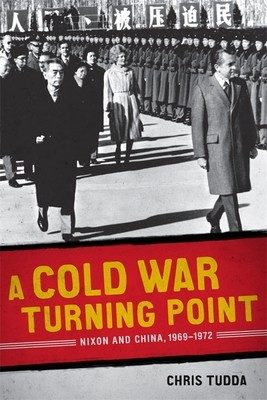
- We will send in 10–14 business days.
- Author: Chris Tudda
- Publisher: LSU Press
- ISBN-10: 0807142891
- ISBN-13: 9780807142899
- Format: 15 x 22.6 x 2 cm, softcover
- Language: English
- SAVE -10% with code: EXTRA
Reviews
Description
In February 1972, President Nixon arrived in Beijing for what Chairman Mao Zedong called the "week that changed the world." Using recently declassified sources from American, Chinese, European, and Soviet archives, Chris Tudda's A Cold War Turning Point reveals new details about the relationship forged by the Nixon administration and the Chinese government that dramatically altered the trajectory of the Cold War.
Between the years 1969 and 1972, Nixon's national security team actively fostered the U.S. rapprochement with China. Tudda argues that Nixon, in bold opposition to the stance of his predecessors, recognized the mutual benefits of repairing the Sino-U.S. relationship and was determined to establish a partnership with China. Nixon believed that America's relative economic decline, its overextension abroad, and its desire to create a more realistic international framework aligned with China's fear of Soviet military advancement and its eagerness to join the international marketplace. In a contested but calculated move, Nixon gradually eased trade and travel restrictions to China. Mao responded in kind, albeit slowly, by releasing prisoners, inviting the U.S. ping-pong team to Beijing, and secretly hosting Secretary of State Henry Kissinger prior to Nixon's momentous visit.
Set in the larger framework of international relations at the peak of the Vietnam War, A Cold War Turning Point is the first book to use the Nixon tapes and Kissinger telephone conversations to illustrate the complexity of early Sino-U.S. relations. Tudda's thorough and illuminating research provides a multi-archival examination of this critical moment in twentieth-century international relations.
EXTRA 10 % discount with code: EXTRA
The promotion ends in 16d.03:24:53
The discount code is valid when purchasing from 10 €. Discounts do not stack.
- Author: Chris Tudda
- Publisher: LSU Press
- ISBN-10: 0807142891
- ISBN-13: 9780807142899
- Format: 15 x 22.6 x 2 cm, softcover
- Language: English English
In February 1972, President Nixon arrived in Beijing for what Chairman Mao Zedong called the "week that changed the world." Using recently declassified sources from American, Chinese, European, and Soviet archives, Chris Tudda's A Cold War Turning Point reveals new details about the relationship forged by the Nixon administration and the Chinese government that dramatically altered the trajectory of the Cold War.
Between the years 1969 and 1972, Nixon's national security team actively fostered the U.S. rapprochement with China. Tudda argues that Nixon, in bold opposition to the stance of his predecessors, recognized the mutual benefits of repairing the Sino-U.S. relationship and was determined to establish a partnership with China. Nixon believed that America's relative economic decline, its overextension abroad, and its desire to create a more realistic international framework aligned with China's fear of Soviet military advancement and its eagerness to join the international marketplace. In a contested but calculated move, Nixon gradually eased trade and travel restrictions to China. Mao responded in kind, albeit slowly, by releasing prisoners, inviting the U.S. ping-pong team to Beijing, and secretly hosting Secretary of State Henry Kissinger prior to Nixon's momentous visit.
Set in the larger framework of international relations at the peak of the Vietnam War, A Cold War Turning Point is the first book to use the Nixon tapes and Kissinger telephone conversations to illustrate the complexity of early Sino-U.S. relations. Tudda's thorough and illuminating research provides a multi-archival examination of this critical moment in twentieth-century international relations.


Reviews